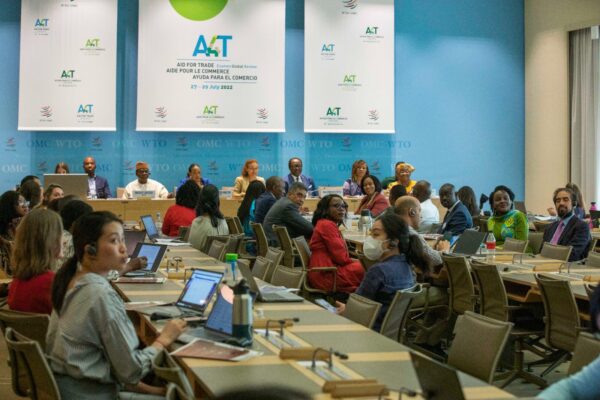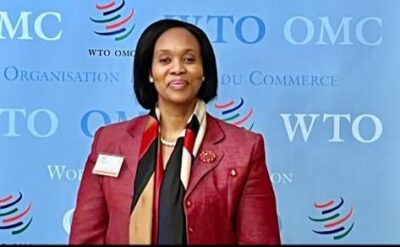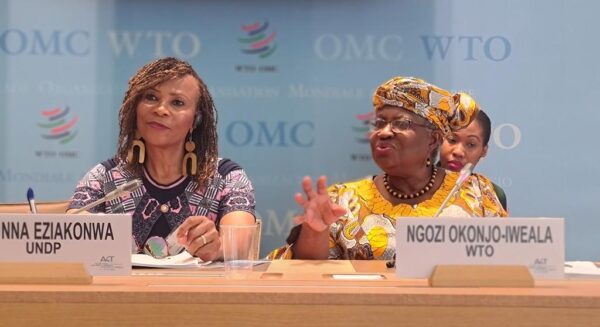According to United Development Programme (UNDP), the COVID 19 pandemic exposed the risk of offshoring production of Africa’s basic needs. From vaccines and PPE to wheat and oil, the real risk is the same: Africa’s sustainability requires a new development approach that focuses on the Made in Africa Revolution. The African Continental Free Trade Area (AfCFTA) has the potential to transform the continent, driving structural economic transformation through trade and investment to create resilient, inclusive and sustainable growth and development in Africa.

The Aid for Trade Global Review 2022 event. Photo Credit UNDP.
With the AfCFTA now in its second year of implementation, working towards expanded intra-regional trade and investment, especially in sectors that are emerging across value chains with great potential for industrialisation, value addition and green growth – is a policy imperative. Seizing these opportunities for SMEs, women and youth necessitates a concerted effort and alignment of public, private and regional and international partners to enhance existing capacities and capabilities to empower Africa’s exporters so that they can seize the benefits of the AfCFTA, and drive reforms paving the way for the realisation of the continental market as a sustainable development accelerator.
In efforts to realize this, UNDP Africa and the International Trade Centre (ITC) organized a side event at the margins of the Aid for Trade Global Review 2022 taking place in Geneva on 27-29 July 2022 to talk about the achievements and remaining building blocks necessary to translate the AfCFTA promises into reality for people and planet in Africa. It provided a platform for influential leaders on trade in both public and private sector, youth and women business representatives – to talk about how Africa can create resilient development models under the AfCFTA dispensation – bearing in mind lessons from both the war in Ukraine and the COVID-19 pandemic.
Among the day’s speakers were Ms Pamela Coke-Hamilton, Executive Director, International Trade Centre, Ms Ahunna Eziakonwa, UNDP Assistant Administrator and Regional Director for Africa, Dr Bright Okogu, Chief of Staff, World Trade Organization and Ms Shiphra Chisha, Graça Machel Trust’s Director of Programmes.

Ms Shiphra Chisha, Graça Machel Trust, Director of Programmes.
Whilst discussing how can Africa can seizeAid4Trade opportunities in AfCFTA, discussions revealed how it provides new trade and investment opportunities. Most importantly, AfCFTA brings something that was not there before; stakeholders together on a common platform, which is very much needed to accelerate development in Africa. Ms Hamilton reiterated that AfCFTA is one of the most groundbreaking decisions ever made as it signals a global repositioning of Africa in the world of trade influence. However, she did note that some of its challenges since its inception include the COVID-19 pandemic, climate change and conflict in different African countries.
Dr Bright also pointed out that Africa has grown beyond simply receiving help. “The pandemic lesson: You’ve got to help yourself. AfCFTA was created as an instrument to achieve Agenda 2063: The Africa We Want. We’re looking at an Africa energized by its own actions,” he said.
Ms Shipra, in her presentation, discussed the work that the Graça Machel Trust does in Women’s Economic and Social Advancement through its programmes and networks. She shared The Graça Machel Trust Women Creating Wealth Programme’s bold ambition of scaling 10 000 Women powered enterprises that will generate US$1bill in revenue and create 500,000 youth job opportunities in the next five years. This will be supported by GMT’s network represented in 17 countries and the GMT Gender Focused Impact Investment vehicle fund, which focuses on gender lens investment. She also identified a few areas that Africa can channel for prosperity. These include enabling informal cross-border trade, wealth creation programmes to help in poverty alleviation and building and growing the African economy through the facilitation of free movement of goods and services. “We need special attention to women, and the upcoming Protocol on Women and Trade is a game changer,” she said.

Dr Ngozi Okonjo-Iweala speaking at the event. Photo credit UNDP Africa.
The World Trade Organization Director-General, Dr Ngozi Okonjo- Iweala, made a surprise appearance, much to the delight of those in attendance. In her brief speech, she urged the participants to reimagine how organizations working on the same problem can work together. She also had an interesting thought in relation to Aid4Trade. She shared, “This may sound like one of my really crazy things. I want to see the title of this change from Aid for Trade to Invest for Trade because I think that the private sector is an essential part of what is being left out. We have to crowd in the private sector, and if we keep calling it Aid for Trade, it changes the perspective.”
At the end of the session, a number of action points were shared as the next steps. They included identifying specific quick wins in the context of AfCFTA to trigger change; coordinating public-private dialogue and finding ways to raise small business voices; and using online tools to help businesses identify opportunities, compare markets and find collaborative partners.
For more: Watch the full session HERE.
Information from the article was sourced from UNDP Africa, World Trade Organization and the Aid for Trade Global Review 2022 event.










 The Trust supports and mobilises civil society networks on issues of ending child marriage, ending violence against children, ending female genital mutilation and promoting children’s rights, to carry out advocacy and action across Africa. Special focus is placed on Malawi, Mozambique, Tanzania and Zambia where child marriage continues to be a problem largely driven by poverty, gender inequality, harmful traditional practices, conflict, low levels of literacy, limited opportunities for girls and weak or non-existent protective and preventive legal frameworks.
The Trust supports and mobilises civil society networks on issues of ending child marriage, ending violence against children, ending female genital mutilation and promoting children’s rights, to carry out advocacy and action across Africa. Special focus is placed on Malawi, Mozambique, Tanzania and Zambia where child marriage continues to be a problem largely driven by poverty, gender inequality, harmful traditional practices, conflict, low levels of literacy, limited opportunities for girls and weak or non-existent protective and preventive legal frameworks.




 Education is a fundamental right for all children, which is also a vehicle for social, economic and political transformation in communities, countries and the African continent at large. Recent studies indicate a lack of progress in some of the critical commitments aimed at improving education quality, access, retention and achievement, particularly for girls. In most African countries, girls may face barriers to learning, especially when they reach post-primary levels of education. By implementing multi-dimensional approaches to education which includes core education, personal development, life skills and economic competencies, the Trust partners with funding partners, governments, civil societies and the private sector to improve education access.
Education is a fundamental right for all children, which is also a vehicle for social, economic and political transformation in communities, countries and the African continent at large. Recent studies indicate a lack of progress in some of the critical commitments aimed at improving education quality, access, retention and achievement, particularly for girls. In most African countries, girls may face barriers to learning, especially when they reach post-primary levels of education. By implementing multi-dimensional approaches to education which includes core education, personal development, life skills and economic competencies, the Trust partners with funding partners, governments, civil societies and the private sector to improve education access.

 The Nutrition and Reproductive, Maternal, New-born, Child and Adolescent Health and Nutrition, (RMNCAH+N) of the Children’s Rights and Development Programme aims at promoting the Global Strategy for women, children and adolescents’ health within the Sustainable Development Goals (SDG) agenda. The strategy emphasises on the importance of effective country leadership as a common factor across countries making progress in improving the health of women, children and adolescents.
The Nutrition and Reproductive, Maternal, New-born, Child and Adolescent Health and Nutrition, (RMNCAH+N) of the Children’s Rights and Development Programme aims at promoting the Global Strategy for women, children and adolescents’ health within the Sustainable Development Goals (SDG) agenda. The strategy emphasises on the importance of effective country leadership as a common factor across countries making progress in improving the health of women, children and adolescents. Through its Early Childhood Development (ECD) plan, The Trust will seek to put into action the new science and evidence Report that was presented by Lancet Series on Good and early development – the right of every child. This will be achieved by mobilising like-minded partners to contribute in the new science and evidence to reach all young children with ECD. The Trust’s goal is to be a catalyst for doing things differently, in particular, to rid fragmentation and lack of coordination across ECD sectors. In response to evidence showing the importance of political will in turning the tide against the current poor access and quality of ECD. Even before conception, starting with a mother’s health and social economic conditions, the early years of a child’s life form a fundamental foundation that determines whether a child will survive and thrive optimally.
Through its Early Childhood Development (ECD) plan, The Trust will seek to put into action the new science and evidence Report that was presented by Lancet Series on Good and early development – the right of every child. This will be achieved by mobilising like-minded partners to contribute in the new science and evidence to reach all young children with ECD. The Trust’s goal is to be a catalyst for doing things differently, in particular, to rid fragmentation and lack of coordination across ECD sectors. In response to evidence showing the importance of political will in turning the tide against the current poor access and quality of ECD. Even before conception, starting with a mother’s health and social economic conditions, the early years of a child’s life form a fundamental foundation that determines whether a child will survive and thrive optimally.